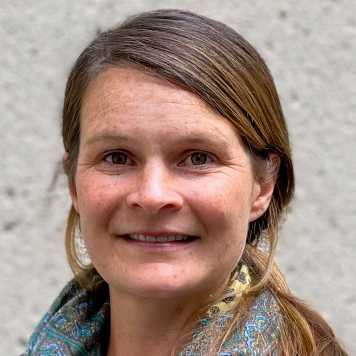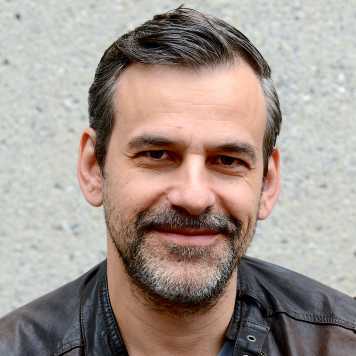“What will matter most is to acquire the related attitudes.”
The "Future Trends and Competencies for the Swiss International Cooperation Sector" report was recently published by cinfo and NADEL. In this interview, NADEL’s Jasmine Neve and Kimon Schneider put the findings in context and offer personal advice for working in the International Cooperation (IC) sector.

Jasmine, what do people working in the International Cooperation sector consider the most important trends that will shape the future of IC?

Jasmine: Some of the top ranked trends included climate change, human displacement and migration, water scarcity, increasing inequalities, and digitalisation and technological change. Regarding the way that IC practitioners will work in the future, nexus approaches, the purposeful overlap, cooperation and use of synergies between peace, humanitarian and development interventions are particularly important.

Kimon: To provide some context: Our report is based on semi-structured surveys of 212 NADEL alumni working in IC and in-depth interviews with 18 IC sector experts who serve as key informants. What Jasmine mentioned refers to the responses of key informants and survey respondents together. If we look at these groups separately, there were some surprising differences.
In what ways did the survey respondents and key informants differ in their assessment of future trends?
Jasmine: Collaboration with the private sector, “localisation” and “decolonisation” were interesting points of difference. They were rated as among the most important trends by key informants but were ranked very low by survey respondents.
Where do you think these differences stem from?
Jasmine: Unfortunately, we didn't have the chance to probe into why or how these differences arose. Some points to note however: although many key informants rated “collaboration with the private sector” as one of the most important trends, there were mixed views on whether this was a good or bad thing. Some felt that the current approach was dangerously overrated, failing on some fronts, and in need of a fundamental re-think; and others saw it as a good thing, bringing efficiency, and additional resources to international cooperation.
Kimon: I was surprised to see that trends like decoloniality were rated rather low by survey respondents and rather high by key informants. Maybe the difference is just due to methodological reasons, I'm not sure.
“Decoloniality is increasingly considered important, however, most people are not sure about its meaning”Kimon Schneider
What do these trends imply for the future of the IC sector?
Jasmine: Many of the important trends were seen as systemically interlinked with cascading effects and implications for the IC sector – such as climate change, water scarcity, human displacement and migration and conflict, for example. This means that IC practitioners will increasingly need to work flexibility across development, peace, humanitarian work. Hence, key informants speculated that there would be a growth in integrated nexus-based approaches that link peace, development and humanitarian work in a holistic way.
Kimon: I personally feel decoloniality is increasingly considered important, however, most people are not sure about its meaning, although the topic as such is not new at all. This complicates a reasonable debate and concerted action. It will hence be important to become more specific in what decoloniality means and define actions to take. Assuming this will happen, an implication may be that donors will review their requirements, and organization's decision-making will become slimmer and more flexible, and human resources will become more inclusive – such as more women and people of color in senior positions.
What competencies do people working in IC need to acquire to address these emerging trends?
Jasmine: The systemic nature of trends and integrated nexus-based approaches will also have important implications for competencies. Some of the most highly ranked competencies were adaptability and flexibility, systems thinking, complex problem solving, as well as collaboration, cooperation and teamwork. These competencies were linked to the systemic trends we discussed earlier.
Kimon: Certain competencies like complex problem-solving, critical thinking, self- awareness, strategic focus and adaptability will become more important. However, I think what will matter most is to acquire the related attitudes. Attitudes related to critical thinking include acknowledging limitations of own knowledge with modesty while staying motivated to learn more. Attitudes related to adaptability are to be open to criticism and setbacks, to see ambiguity and change as an opportunity to learn, and to be willing to move forward despite ambiguity. And attitudes related to complex problem-solving include to be persistent and comfortable with adopting a ‘can do’ approach when tackling problems, and to be comfortable with solving non-familiar problems.
“Standard frontal classroom teaching is ineffective. We should explore more alternative methods addressing emotions, and less cognition.”Kimon Schneider
What do you think are the most effective methods for teaching professionals the competencies necessary for working in IC?
Kimon: Learning by doing – experiential learning – and "alternative" methods like Immunity to Change, which helps individuals and organizations identify and overcome hidden personal barriers by uncovering their underlying assumptions and beliefs. Or Nonviolent Communication, an approach that focuses on empathy, understanding, and conflict resolution in communication. Standard frontal classroom teaching is ineffective. We should explore more alternative methods addressing emotions, and less cognition.
Looking back on your personal experiences, what fundamental changes have occurred in the IC sector since you started working in it and how have you adapted?
Kimon: I have mainly observed increasing complexity of basically everything, and corresponding perception of being overwhelmed whether it is about managing programs and hiring staff or dealing with specific topics or doing research. I have accordingly adjusted by learning by doing, including accepting my weaknesses and vulnerability – and I did less focus on trying to understand everything at all times
Jasmine: We question what we do and how we do it more than we used to. This is very healthy, but we should still do it more!
“Be humble, and aware of the limitation of your own knowledge. This is so important for critical thinking.”Jasmine Neve
Based on your personal experience, what single recommendation would you give to young professionals starting to work in IC?
Kimon: Be as flexible as possible, and critically conscious.
Jasmine: Be humble, and aware of the limitation of your own knowledge. This is so important for critical thinking.
Thank you for the interview, Jasmine and Kimon.
Jasmine Neve is a Senior Lecturer at NADEL with a focus on climate change, environment and migration.
Kimon Schneider is a Senior Lecturer at NADEL with a focus on results-based project management, monitoring, evaluation and learning and capacity building.